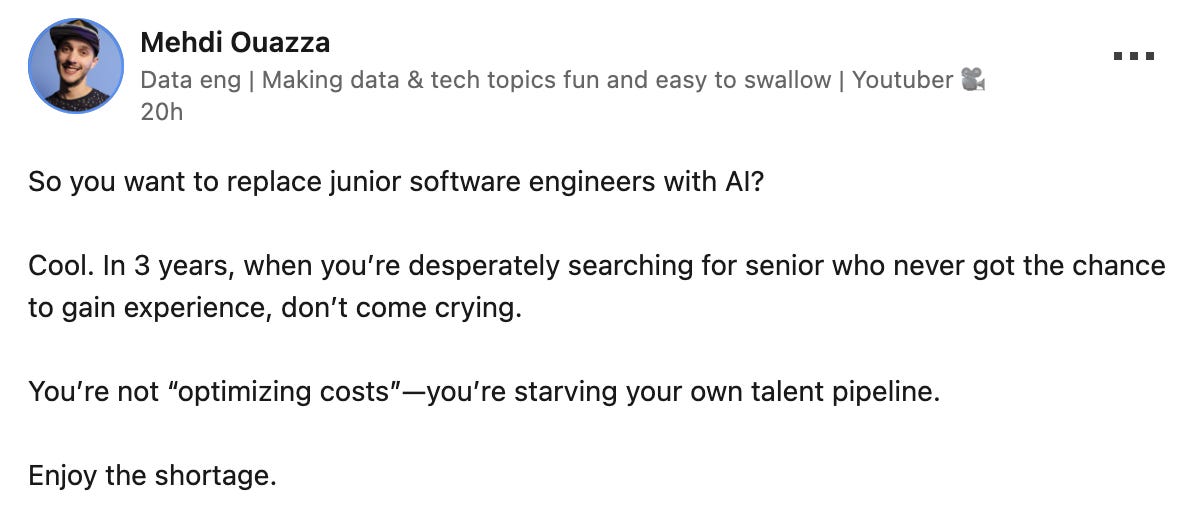Deepseek cracked AI training. Human training? That’s still a conundrum.
Deepseek recently made headlines for training AI effectively. The crisis that doesn’t make the headlines affects younger generations. Who will hire and train future entry-level workers in the AI age?
Young people are facing a jobs crisis. Until recently, white-collar workers relied on young talent to do the grunt work that no one else wanted to do.
This was a good trade-off as eager grads could “learn the ropes” and get their foot in the door. But with grunt work delegated to AI, have we sleepwalked into a situation where that door has now closed shut?

In this week’s edition, I talk to Peter Wood, Founder and CEO of The Graduate Guide. After seeing this problem up close, he launched a community to help. In the UK alone, 54% of employers find it challenging to recruit for graduate roles1, and 40% of graduates cannot find high-skilled work2.
He believes the problem can be solved through the power of community.
We discuss:
His advice to young people looking for their first job
What universities need to change in the AI age
How communities like the Graduate Guide can help
His advice to young people looking for their first job
Peter’s story is different from what his LinkedIn profile might suggest. He got into one of the best universities in the world, University College London (UCL). You might assume finding a job was easy for him, yet he feels that academia did not allow him to play to his strengths.
“
I wouldn't have gone far if I’d continued the academic route. My career started by simply reaching out to people and being curious. They’d wonder how I’d come across them, but most of the time, it was as simple as saying, “I like this poster; I wonder who created it,” and then following up to see if I could find out. In most cases, people were flattered that I wanted to speak to them. Many of these people eventually supported me in my career.
This advice is helpful for anyone, regardless of age. Reaching out to people whose work you admire can lead to hidden opportunities. Given its effectiveness, why is it still rare to see people doing this? Embarrassment? Fear of rejection? Societal norms?
“
It's a societal issue. Once people become successful, they’re often asked, “How did you do it?” The answer is pretty simple: doing the things that most people would find embarrassing, putting yourself out there. One thing you can do on a micro level is become comfortable with doing things others might find embarrassing and not take yourself too seriously. The worst that can happen is you fail, and there’s value in that, too.
Again, this is great advice regardless of age. It’s easy to idolise “overnight” success stories without seeing the grit, determination, and multiple failed attempts that preceded them. Yet it isn’t something taught in universities.
What universities need to change in the AI age
Exam-based assessments have always been flawed and are often useless in gauging an individual’s effectiveness in the workplace. Emotional intelligence usually ends up being much more helpful than IQ. Peter has a unique perspective:
“
I hope AI results in education being treated less as a box-ticking exercise. The largest virtual school in the UK (Minerva) is innovating in assessing students. It allows them to opt into different exam boards. One might focus more on writing and the other on oral communication. People should be able to lean into their strengths, and this is where AI can help to cater to the individual's needs, rather than a one-size-fits-all approach.
I’m also curious how universities have adapted their career advice over the last two decades (back when this old soul was a grad). It seems not a lot has changed:
“
Curiousness and willingness to reach out to others have not been incorporated into university education. Yet this is so important, and I’m trying to help normalise it through The Graduate Guide. We need to enhance young people’s ability to reach out to those with experience who are further along in their careers. In-person relationships will become even more crucial as AI floods online applications.
I’m bullish on communities like the Graduate Guide. AI is already flooding the open web with bland, mass-generated content. Closed communities can counter the noise and help create genuinely valuable connections—which is much more difficult on LinkedIn.
How communities like the Graduate Guide can help
“
Being on LinkedIn puts you in the top 5-10% of people with career consciousness. But there’s a whole universe of people not on there. We need to reach those people too.
Admittedly, I’m sceptical of social media in the long term. You’ve probably already seen AI-generated comments and posts on LinkedIn, and I think this will only grow as a trend. With its rage-baiting and click-bait videos, it’s getting harder to distinguish LinkedIn from TikTok.
This is where communities like the Graduate Guide can provide an alternative and foster deep connections that provide helpful guidance for those starting their careers.
“
I have a following on LinkedIn, and I care about reaching people because it’s a part of our mission. But I ensure I’m reaching the right people, either students or founders or anyone who can contribute to our mission of empowering the next generations to explore and build their careers. Since I started building this community, viewership has gotten much stronger, and I haven’t spent a lot of time trying to hack LinkedIn’s algorithm
Wrap up
Getting a foot on the career ladder has always been difficult. But when so much of the work that young graduates do is now replaced by AI, it creates a problem that affects them in the short term but affects all of us in the long term.
We should not sleepwalk into a situation where talent pipelines are starved of early-stage talent. This has grave implications for the future of work that are not being discussed enough.
I’m rooting for Peter and The Graduate Guide, and I believe many other upstarts can contribute to solving this problem. However, our educational institutions, governments, and those further along in our careers must also be part of the solution.
We’ll all feel the pain soon enough, if not.
https://ise.org.uk/page/ISE_Recruitment_Survey_2023
https://explore-education-statistics.service.gov.uk/find-statistics/graduate-labour-markets

